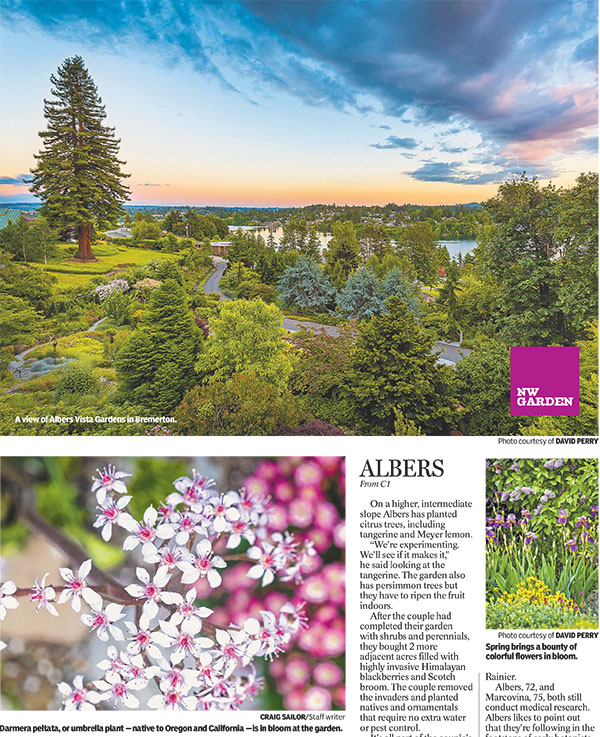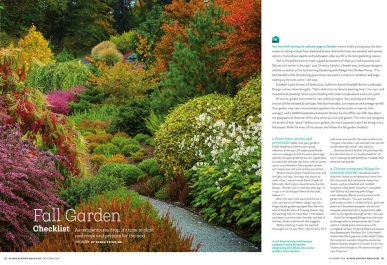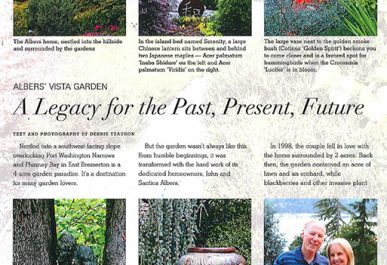John Albers’ garden of rooms is designed to thrive, survive
February 2, 2014Text gives essentials for “green” gardening
July 10, 2014
Article by Craig Sailor published Wednesday, April 23, 2014 on The Olympian.

In a shadowy glade near Bremerton, a garden grows. From a small forest of maples and rhododendrons, it rises onto a sunny slope of lavender and citrus trees. From there it climbs through viburnums and rare conifers to surround a gazebo that has a panoramic view of Phinney Bay and the Olympic Mountains.
Just when a visitor thinks the garden can’t possibly go higher, it does. Farther it climbs, now hundreds of feet from where it began. Finally, it ends in a woodland of madrona trees.
Albers Vista Gardens is the vision of two medical researchers who have created a preserve of rare plants and a model for sustainable horticulture.
“We collect, but we want something aesthetically pleasing. I think we’ve accomplished both,” John Albers said.
Albers and his wife, Santica Marcovina, found the property in 1988 while they were living in Seattle. The pair were both research professors of medicine at the University of Washington. They bought the 2 acres and made it their home.
At first there was little more than lawn and an old fruit orchard. Rock by rock Albers laid out paths of granite steppingstones and rock dust on the southwest facing hillside. Then the couple began to plant.
Today, a mind-boggling variety of conifers provide a backbone for the garden. A dwarf cedar of Lebanon (“Green Prince”) looks like a fairyland tree as it grows on a Japanese styled “island” in a sea of gravel. Nearby, a Korean fir displays young purple colored cones.
On a higher slope, a newly planted section contains dozens of dwarf conifers in colors that range from blue to yellow and forms that cover weeping to upright. The area looks like a dog park for odd little pooches. After the first conifers were added, broadleaf trees were brought in. A maple with bark that looks like snakeskin and another that looks like a cobblestone street border the only patch of lawn in the garden.
On a higher, intermediate slope Albers has planted citrus trees, including tangerine and Meyer lemon.
“We’re experimenting. We’ll see if it makes it,” he said looking at the tangerine. The garden also has persimmon trees but they have to ripen the fruit indoors.
After the couple had completed their garden with shrubs and perennials, they bought 2 more adjacent acres filled with highly invasive Himalayan blackberries and Scotch broom. The couple removed the invaders and planted natives and ornamentals that require no extra water or pest control.
It’s all part of the couple’s sustainable horticultural philosophy. They plant only drought-tolerant plants (no supplemental water is used in the garden), species that are resistant to pests and plants that require no fertilizer. Albers believes that even urban dwellers on standard city plots can greatly increase the botanical diversity of their plants. A thriving patch of trees, shrubs and perennials demand less and give back more than an unused but over maintained section of lawn.
“We depend on plants to give back clean water and clean air which we take for granted,” Albers said. Though the couple actively searches out new plants that fit their philosophy, they don’t ignore the beauty that a garden can provide. Marcovina has integrated art throughout the garden, which has 14 themed areas and a view of Mount Rainier.
Albers, 72, and Marcovina, 75, both still conduct medical research. Albers likes to point out that they’re following in the footsteps of early botanists who were also physicians.
Albers took classes from Northwest botanist C. Leo Hitchcock after Albers arrived at the University of Washington in 1971. Gardening helps him to unwind from the pressures and detail- focused world of medicine.
In 2007, the couple established the nonprofit Albers Vista Gardens Foundation to preserve the garden for generations. They will soon erect a building to house a library and hold workshops. They believe in education and sharing their garden with the public. To that end they have several open garden events during the year. The next two are scheduled for May 4 and 11. Albers Vista Garden is bringing its namesake a second career of sorts. “In many ways my life is just getting started,” he said.



